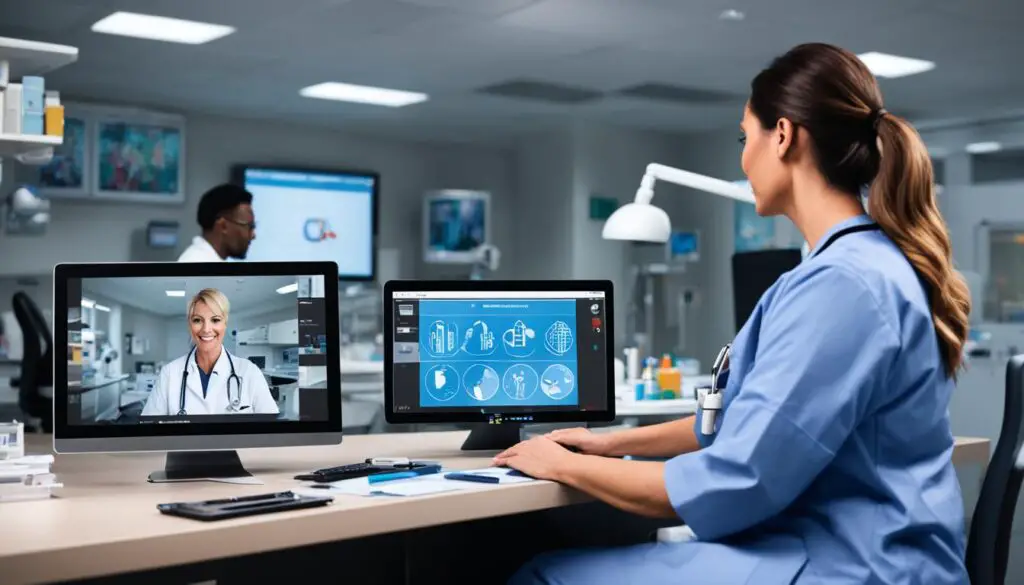
Welcome to our article on LPN Remote jobs, exploring the possibilities of licensed practical nurses working from a distance. As the healthcare industry continues to evolve, remote patient care and telehealth services are becoming increasingly prevalent. This article aims to provide a comprehensive guide for LPNs interested in pursuing remote nursing opportunities. We will cover everything from job requirements and training to salary potential and career development.
LPN Remote jobs offer an exciting new way for licensed practical nurses to utilize their skills in a remote setting. With advancements in technology, remote patient care is proving to be effective and efficient, paving the way for more opportunities in this field.
The Role of a Licensed Practical Nurse (LPN)
A licensed practical nurse (LPN) is a healthcare professional who provides essential nursing care to patients under the direction of a registered nurse (RN) or a physician. The role of an LPN is to ensure the comfort and well-being of patients, provide them with emotional support, and assist in their overall recovery process.
LPNs work in various healthcare settings, including hospitals, nursing homes, and clinics. They are responsible for providing basic care to patients, such as monitoring vital signs, administering medications, and assisting with daily activities like bathing, dressing, and eating. LPNs also work closely with other members of the healthcare team, such as RNs and physicians, to develop and implement care plans that meet the specific needs of each patient.
In addition, with the rise of telehealth, LPNs are becoming increasingly involved in remote patient care. They are trained to communicate with patients via telehealth platforms, monitor patient progress, and provide remote nursing services as necessary. This allows LPNs to continue providing essential care to patients remotely while maintaining patient safety and comfort.
Entry opportunities for LPNs in the remote nursing field include telehealth companies and home healthcare agencies that offer remote nursing services. LPNs can also utilize their existing healthcare network to explore remote nursing options.
LPN Remote Jobs: Global Demand and Opportunities
LPN Remote jobs have been gaining popularity worldwide, and countries with high demand for this profession are increasing. In recent years, the United States has seen a rapid development in the telehealth sector, with many healthcare providers embracing remote nursing. Europe is also catching up fast, with telehealth and remote nursing gaining traction among healthcare institutions. Other regions, including Asia and the Middle East, are starting to adopt telemedicine practices, with many LPN Remote opportunities starting to emerge.
LPN Remote jobs offer a unique opportunity for nurses to work remotely, providing healthcare services to a wider range of patients. These jobs allow nurses to work from home or from other remote locations, providing flexible work arrangements and a better work-life balance.

| Country | LPN Remote Job Opportunities | Telehealth Infrastructure |
|---|---|---|
| United States | High | Developed |
| Canada | High | Developed |
| United Kingdom | Medium | Developed |
| Australia | High | Developed |
| India | Low | Developing |
| China | Low | Developing |
The availability of LPN Remote jobs varies depending on the country and region. In some parts of the world, LPN Remote opportunities are still limited, while in others, they are more prevalent. Countries with developed telehealth infrastructure offer a higher number of job openings for LPNs, while developing countries are more likely to have limited job opportunities.
As remote nursing continues to grow, LPNs have more opportunities to work remotely in various healthcare settings, including home healthcare, telehealth companies, and hospitals. The demand for LPN Remote jobs is expected to continue to increase globally, providing nurses with more opportunities to work remotely while delivering quality care to patients.
Training and Studies for LPN Remote Jobs
Remote nursing requires specialized training and qualifications to perform telehealth services and provide remote patient care. Here are the essential studies, training, and certifications that aspiring LPN remote nurses need to succeed:
- LPN Degree: To become an LPN, candidates typically need to complete a state-approved nursing program. These programs typically take a year to complete and include coursework in nursing fundamentals, patient care, and health assessment.
- Remote Nursing Training: Beyond the LPN degree, remote nurses require additional training in telehealth software, remote patient monitoring, and other technologies essential to providing remote care. Be sure to seek out specialized training programs that offer these crucial skills.
- Certifications: Some remote nursing positions may require additional certifications, including Basic Life Support (BLS) and Advanced Life Support (ALS) certifications. A strong background in electronic medical records (EMR) and clinical documentation is also essential.
- Continuing Education: The remote nursing landscape is constantly evolving, and LPNs need to stay up to date with the latest industry trends and technologies. Continuing education courses, webinars, and other professional development resources can help LPNs stay current in their field and advance their qualifications.
Investing in the right training and studies is essential to prepare for a successful LPN remote career and stay competitive in a rapidly evolving telehealth landscape.

Applying for LPN Remote Jobs: Tips and Advice
When applying for LPN remote jobs, it’s crucial to highlight your experience and skills in providing patient care and remote healthcare services. Here are some practical tips and advice for LPNs looking to apply for remote nursing positions:
- Tailor your resume and cover letter to showcase your relevant experience in remote nursing.
- Emphasize your ability to use telehealth platforms and technology to provide care remotely.
- Include details about any specialized training or certification related to remote nursing.
- Highlight your communication skills and ability to empathize with patients in a remote setting.
- Research the employer and the specific role to understand their requirements and expectations for remote nursing staff
- Use keywords and phrases in your application that match the requirements of the job listing.
- Provide specific examples of how you have helped patients remotely.

Remember that LPN remote jobs require a unique set of skills and competencies, so be sure to tailor your application materials accordingly. By following these tips and highlighting your strengths in remote nursing, you can increase your chances of landing the ideal LPN remote job.
LPN Remote Jobs Across Different Sectors and Industries
LPNs can work in various healthcare settings, providing remote nursing services across different sectors and industries. Here are some of the most common:
| Healthcare Setting | Description |
|---|---|
| Hospitals | LPNs can provide remote monitoring and care services for hospital patients, such as wound care and medication management. |
| Clinics | LPNs can conduct telehealth consultations for patients with chronic illnesses or minor injuries, offering advice and support remotely. |
| Telehealth Companies | LPNs can work for telehealth companies that provide remote healthcare services to patients across the country. They may work in call centers or as part of a remote nursing team. |
| Home Healthcare | LPNs can provide remote nursing services to patients in their own homes, helping them manage chronic illnesses, provide wound care, and administer medication. |
These sectors and industries offer a diverse range of opportunities for LPN remote jobs, providing a varying degree of challenges and rewards for licensed practical nurses looking to make a career in the remote nursing field.
Salary and Development Opportunities for LPN Remote Jobs
LPN Remote jobs offer competitive salaries and various growth opportunities. The potential salary of an LPN Remote job varies based on factors such as location, level of education, and experience.
According to Payscale, the average hourly wage of an LPN in the United States is $21.21. However, LPNs working in remote nursing jobs may earn even higher than the national average, depending on their experience and expertise. Some remote nursing opportunities may also offer bonuses and other incentives.
LPNs interested in pursuing a career in remote nursing can also explore various professional development opportunities. They can take relevant online courses and training programs to enhance their skills and knowledge in the field. Moreover, LPNs can also pursue advanced degrees, such as a Bachelor of Science in Nursing (BSN) or a Master of Science in Nursing (MSN), to unlock more advanced remote nursing roles and increase their earning potential.
Overall, LPN remote jobs offer promising salary prospects and a wide variety of development and growth opportunities.
Required Skills for LPN Remote Jobs
LPN Remote jobs require a unique skill set that combines technical aptitude, nursing expertise, and soft skills. In addition to holding a valid nursing license, LPNs must possess certain qualities to excel in the remote nursing environment.
Technical Skills
LPNs must have a strong understanding of telehealth platforms and related equipment. Knowledge of electronic health records (EHRs), video conferencing software, and remote monitoring devices is crucial. LPNs should also be adept at troubleshooting technical issues and providing technical support to patients and colleagues.
Medical Knowledge
To be effective in remote nursing, LPNs must have a thorough understanding of medical terminology, treatment protocols, and patient care best practices. This requires keeping up with the latest developments in the nursing field, including advancements in telehealth and new treatment modalities.
Soft Skills
Effective communication skills are essential for LPNs in remote nursing roles. They must be able to communicate clearly and empathetically with patients, family members, and colleagues. Critical thinking skills are also vital, as remote nurses must assess patient needs and make recommendations for care without having all the necessary information in front of them.
Adaptability and self-motivation are also critical soft skills for LPNs in remote nursing roles. As remote nursing settings can vary widely, LPNs must be flexible and able to adjust to changing circumstances. Self-motivation is also essential, as remote nursing can be a solitary, independent profession that requires a high degree of self-discipline and self-direction.
Similar Jobs and Professions in the Remote Healthcare Field
While LPN Remote jobs offer a unique blend of patient care and telehealth services, there are other similar job roles available in the remote healthcare field. These professions require similar skills and qualifications as LPNs and allow nurses to work remotely, providing healthcare services to patients from a distance. Here are some related careers in the remote healthcare sector:
Remote Medical Coders
Remote medical coders review and analyze medical records to assign appropriate codes for billing purposes. They require knowledge of medical terminology and coding classifications, as well as attention to detail and accuracy. Remote medical coders can work in various healthcare settings, including hospitals, clinics, and insurance companies, and can earn a competitive salary.
Telehealth Nurses
Telehealth nurses provide nursing care and support to patients remotely using digital communication technologies. They use video-conferencing, phone calls, and chat messaging to interact with patients and provide advice, education, and counseling. Telehealth nurses need strong technical skills, such as familiarity with telehealth equipment and software, as well as excellent communication and patient care skills.
Virtual Nursing Assistants
Virtual nursing assistants provide administrative and clinical support to healthcare providers and patients remotely. They manage patient records, schedule appointments, and assist with basic medical procedures, such as taking vital signs and administering medication. Virtual nursing assistants require strong organizational and communication skills, as well as knowledge of medical terminology and basic healthcare procedures.
Overall, the remote healthcare industry offers a range of job opportunities that allow licensed practical nurses to provide patient care and healthcare services from the comfort of their own homes. By leveraging their skills and qualifications, LPNs can find rewarding and meaningful careers in the remote nursing field.
Questions and Answers
What is remote nursing?
Remote nursing, also known as telehealth nursing, is a practice where licensed practical nurses (LPNs) provide healthcare services and patient care remotely. It involves using technology and telecommunication tools to communicate with patients, assess their needs, deliver treatments, and monitor their progress from a distance.
What are the key tasks of a licensed practical nurse (LPN) in remote nursing?
Licensed practical nurses (LPNs) in remote nursing are responsible for various tasks. These include conducting virtual patient assessments, providing advice and education to patients and their families, administering medications remotely, monitoring vital signs through remote monitoring devices, and coordinating telehealth visits and consultations with other healthcare professionals.
Are there entry opportunities available for LPNs in the remote nursing field?
Yes, there are entry opportunities available for LPNs in the remote nursing field. Many healthcare organizations and telehealth companies offer training programs and on-the-job training for LPNs who want to transition into remote nursing. Additionally, LPNs can gain remote nursing experience by working in traditional healthcare settings and then exploring remote nursing opportunities within those organizations.
Which countries have a high demand for LPN Remote jobs?
The demand for LPN Remote jobs varies from country to country. In the United States, there is a growing demand for remote nursing due to the increasing popularity of telehealth services. European countries such as the United Kingdom, Germany, and the Netherlands also have a high demand for remote nursing professionals. Other regions, such as Australia and Canada, are also experiencing an increasing need for remote nursing services.
What is the current situation for LPN Remote jobs in the United States?
LPN Remote jobs are in high demand in the United States, as the telehealth industry continues to grow. With advancements in technology and changes in healthcare policies, more healthcare organizations are implementing remote nursing as a way to provide quality care to patients in the comfort of their own homes. This has created numerous opportunities for LPNs to work remotely and deliver healthcare services through telehealth platforms.
What is the current situation for LPN Remote jobs in Europe?
LPN Remote jobs are also in demand in Europe, particularly in countries that have embraced telehealth services. The European Union has recognized the potential of remote nursing to improve healthcare access and quality, leading to increased adoption of telehealth platforms and remote nursing solutions. This has created opportunities for LPNs to work remotely and provide healthcare services to patients across Europe.
What is the current situation for LPN Remote jobs in other regions?
The demand for LPN Remote jobs is not limited to the United States and Europe. Other regions, such as Australia, Canada, and parts of Asia, are also experiencing an increasing need for remote nursing services. As telehealth continues to gain acceptance worldwide, the demand for LPNs with remote nursing skills is expected to grow in various regions.
What training and studies are required for LPNs interested in pursuing remote nursing jobs?
LPNs interested in pursuing remote nursing jobs should typically have completed a state-approved practical nursing program and obtained a license to practice as an LPN. Additionally, they may need to undergo specialized training on telehealth platforms, remote patient monitoring devices, and other telehealth technologies. Some organizations offer training programs specifically designed for LPNs transitioning into remote nursing.
How can LPNs apply for remote nursing jobs?
LPNs can apply for remote nursing jobs through various channels. They can search for job openings on healthcare job websites, submit their resumes and cover letters directly to healthcare organizations offering remote nursing positions, or reach out to telehealth companies that employ remote nurses. It’s important for LPNs to highlight their remote nursing experience or transferable skills in their applications to increase their chances of securing a remote nursing job.
What are employers looking for when hiring LPNs for remote roles?
When hiring LPNs for remote roles, employers typically look for candidates with strong communication skills, the ability to work independently, and proficiency in using telehealth technologies. They may also prefer LPNs who have previous experience in remote nursing or have completed relevant training programs. Employers value LPNs who can effectively communicate with patients virtually and provide compassionate, high-quality care remotely.
In which sectors and industries can LPNs find remote nursing jobs?
LPNs can find remote nursing jobs in various sectors and industries. These include hospitals, clinics, telehealth companies, home healthcare agencies, and nursing homes. Many healthcare organizations have developed their own telehealth programs and employ LPNs to provide remote nursing services. Additionally, there are telehealth platforms and apps that connect LPNs with patients seeking remote care.
What is the salary potential for LPN Remote jobs, and what development opportunities are available?
The salary potential for LPN Remote jobs can vary based on factors such as experience, location, and industry. On average, LPNs can expect competitive salaries in the remote nursing field, with potential for growth and advancement. LPNs can take advantage of continuing education programs, specialized training, and certifications to enhance their skills and increase their earning potential. Additionally, LPNs can explore leadership roles or specialize in specific areas of remote nursing to further their career development.
What are the required skills for LPNs in remote nursing jobs?
LPNs in remote nursing jobs need a combination of technical and soft skills. Technical skills include proficiency in using telehealth platforms, remote patient monitoring devices, and electronic health records systems. Soft skills such as effective communication, empathy, critical thinking, and adaptability are also essential in the remote nursing environment. LPNs should be able to provide compassionate care remotely and effectively engage with patients through virtual communication channels.
What are some similar jobs and professions in the remote healthcare field?
There are several similar jobs and professions in the remote healthcare field that LPNs may consider. These include roles such as remote medical coders, telehealth nurses, virtual nursing assistants, and remote patient monitoring specialists. While these roles may have differences in specific responsibilities, they all involve providing healthcare services remotely and contributing to the overall goal of improving patient care through remote healthcare delivery.
